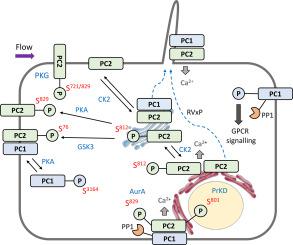当前位置:
X-MOL 学术
›
Cell. Signal.
›
论文详情
Our official English website, www.x-mol.net, welcomes your
feedback! (Note: you will need to create a separate account there.)
Post-translational modifications of the polycystin proteins.
Cellular Signalling ( IF 4.4 ) Pub Date : 2020-04-19 , DOI: 10.1016/j.cellsig.2020.109644 Andrew Streets 1 , Albert Ong 1
Cellular Signalling ( IF 4.4 ) Pub Date : 2020-04-19 , DOI: 10.1016/j.cellsig.2020.109644 Andrew Streets 1 , Albert Ong 1
Affiliation

|
Autosomal dominant polycystic kidney disease (ADPKD) is the most common inherited cause of kidney failure and affects up to 12 million people worldwide. Germline mutations in two genes, PKD1 or PKD2, account for almost all patients with ADPKD. The ADPKD proteins, polycystin-1 (PC1) and polycystin-2 (PC2), are regulated by post-translational modifications (PTM), with phosphorylation, glycosylation and proteolytic cleavage being the best described changes. A few PTMs have been shown to regulate polycystin trafficking, signalling, localisation or stability and thus their physiological function. A key challenge for the future will be to elucidate the functional significance of all the individual PTMs reported to date. Finally, it is possible that site-specific mutations that disrupt PTM could contribute to cystogenesis although in the majority of cases, confirmatory evidence is awaited.
中文翻译:

多囊蛋白的翻译后修饰。
常染色体显性多囊肾病 (ADPKD) 是肾功能衰竭最常见的遗传原因,影响全球多达 1200 万人。PKD1 或 PKD2 这两个基因的种系突变几乎可以解释所有 ADPKD 患者。ADPKD 蛋白 polycystin-1 (PC1) 和 polycystin-2 (PC2) 受翻译后修饰 (PTM) 的调控,其中磷酸化、糖基化和蛋白水解切割是描述得最清楚的变化。一些 PTM 已被证明可以调节多囊蛋白的运输、信号传递、定位或稳定性,从而调节它们的生理功能。未来的一个关键挑战将是阐明迄今为止报告的所有单个 PTM 的功能意义。最后,
更新日期:2020-04-19
中文翻译:

多囊蛋白的翻译后修饰。
常染色体显性多囊肾病 (ADPKD) 是肾功能衰竭最常见的遗传原因,影响全球多达 1200 万人。PKD1 或 PKD2 这两个基因的种系突变几乎可以解释所有 ADPKD 患者。ADPKD 蛋白 polycystin-1 (PC1) 和 polycystin-2 (PC2) 受翻译后修饰 (PTM) 的调控,其中磷酸化、糖基化和蛋白水解切割是描述得最清楚的变化。一些 PTM 已被证明可以调节多囊蛋白的运输、信号传递、定位或稳定性,从而调节它们的生理功能。未来的一个关键挑战将是阐明迄今为止报告的所有单个 PTM 的功能意义。最后,











































 京公网安备 11010802027423号
京公网安备 11010802027423号